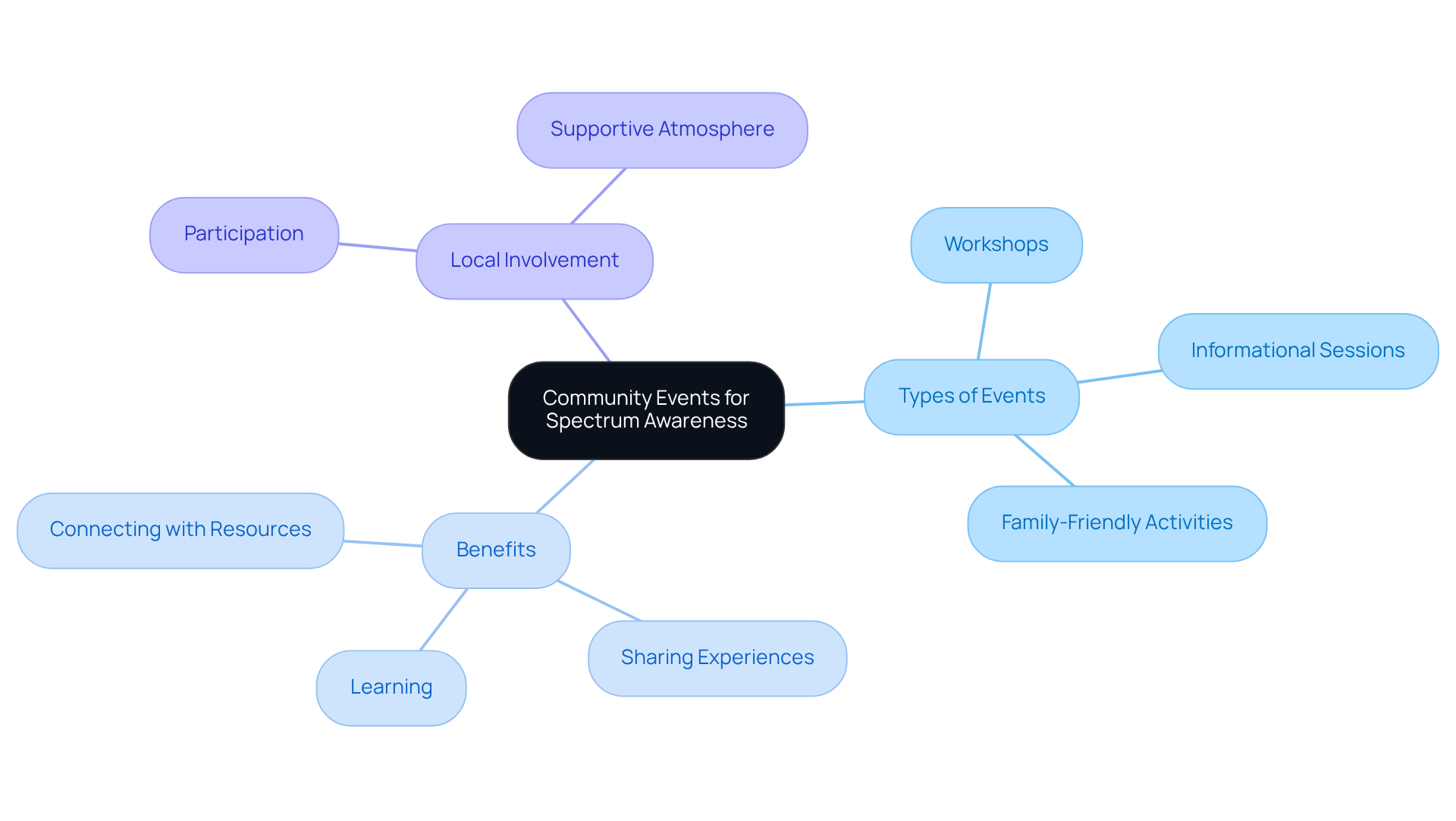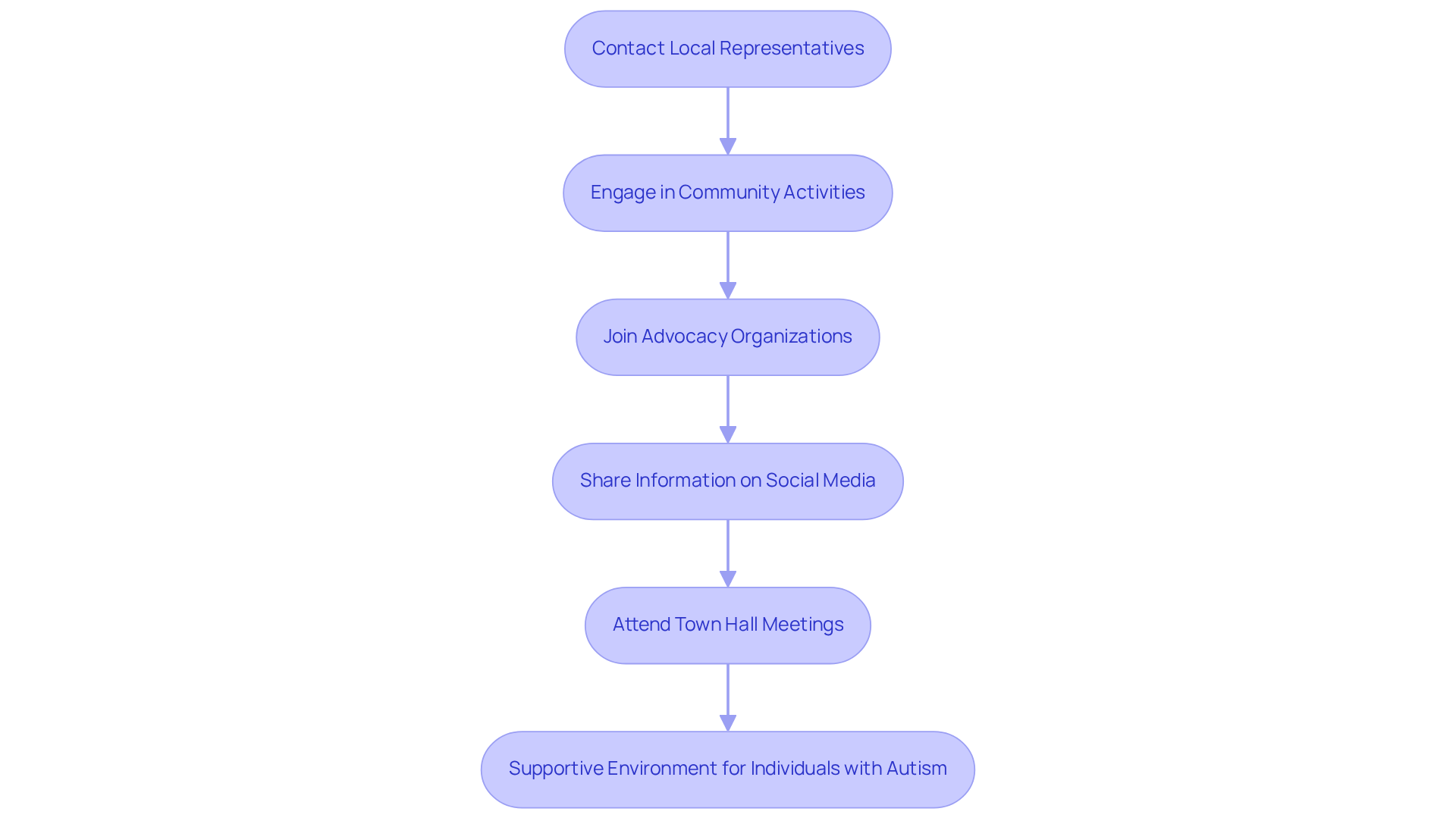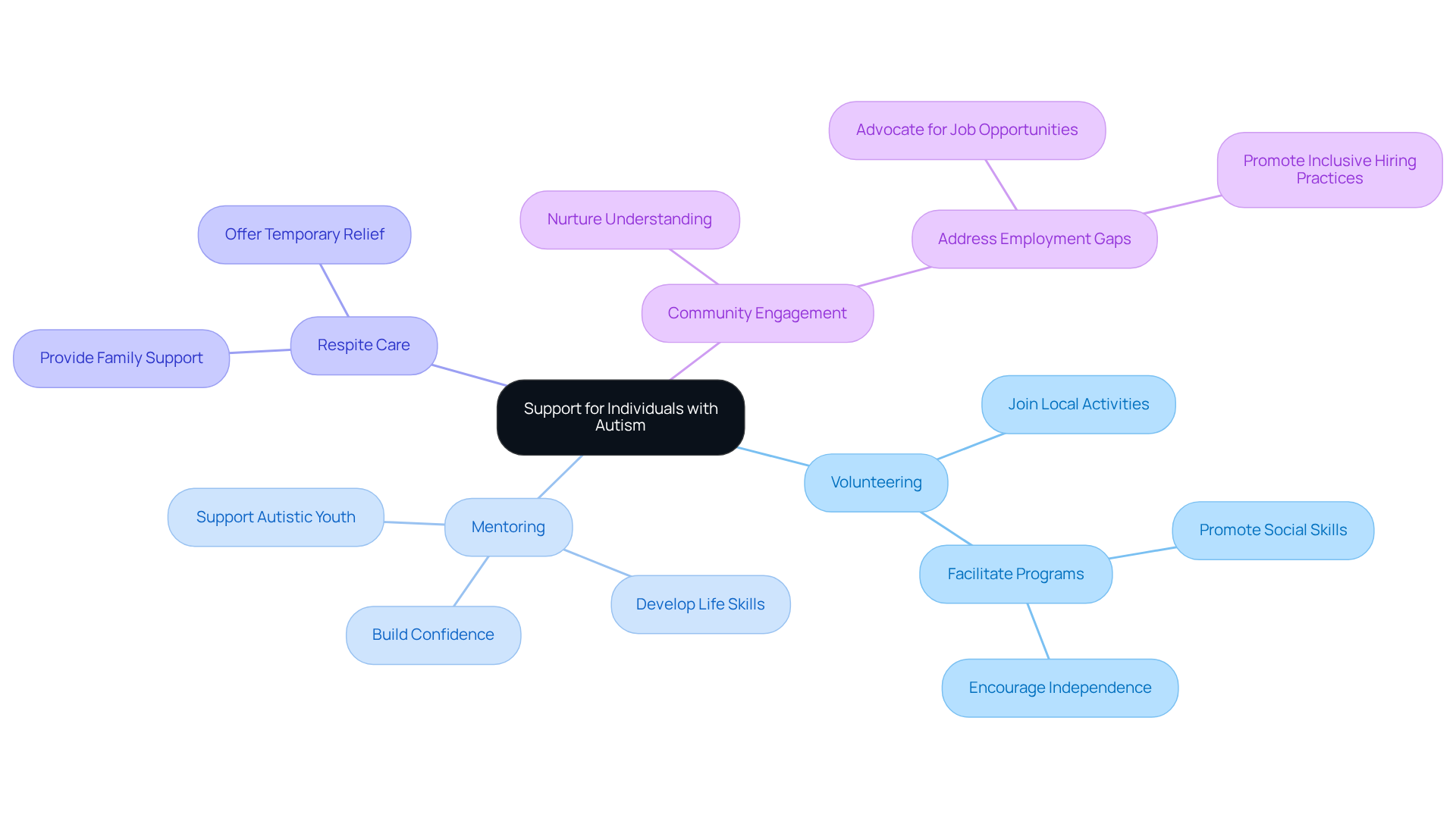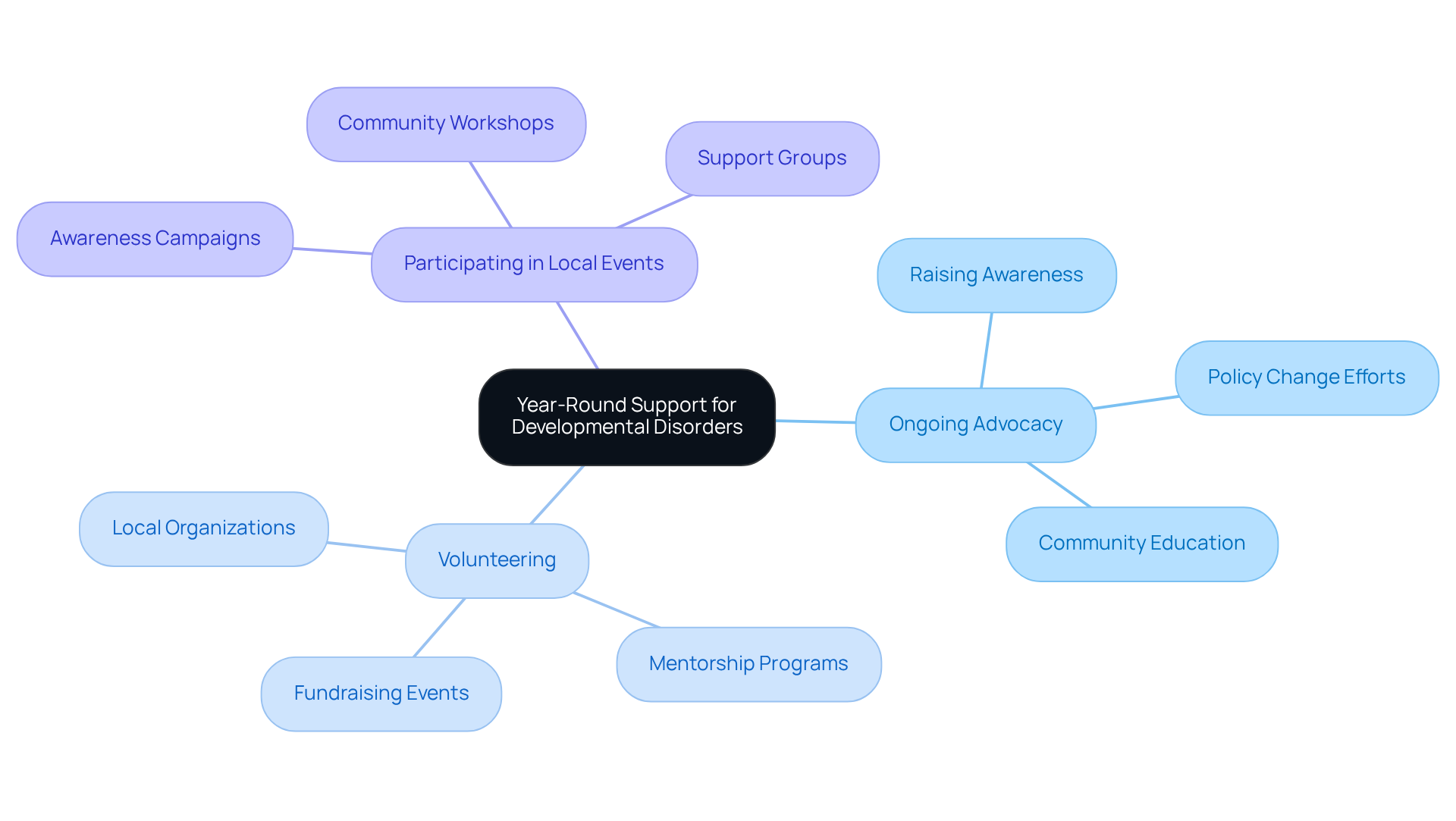Overview
This article highlights ten compassionate ways to celebrate April Autism Awareness Month, emphasizing the importance of community engagement, education, advocacy, and ongoing support. By hosting events, sharing valuable resources, and collaborating with organizations, we can significantly enhance awareness and cultivate a nurturing environment for individuals affected by autism. This effort ultimately leads to a culture of acceptance and understanding that extends throughout the year. Together, we can make a meaningful difference in the lives of those in our community.
Introduction
April Autism Awareness Month serves as a heartfelt reminder of the significance of understanding and supporting individuals on the autism spectrum. With approximately 1 in 44 children diagnosed with autism in the U.S., the urgency for effective awareness initiatives is more critical than ever. This article delves into ten impactful ways to celebrate Autism Awareness Month, offering practical strategies to foster inclusivity, promote education, and engage our communities.
How can we, as individuals and organizations, unite to create lasting change and provide unwavering support for those affected by autism?
ASD Media: Empowering Parents and Professionals for Autism Awareness Month
ASD Media plays a crucial role in April Autism Awareness Month by offering essential resources and support for parents and professionals. With approximately 1 in 44 children in the U.S. identified with autism each year, the need for awareness is more important than ever. Through targeted newsletters and informative webinars, ASD Media provides a platform for individuals to share their experiences and learn effective strategies for promoting understanding of the condition.
The organization fosters a collaborative environment that encourages involvement from the local community, ensuring that members of the neurodiverse group can access vital resources. Alarmingly, 51% of families with a child on the spectrum report limited access to treatment information, highlighting the importance of local support. This collective effort not only raises awareness but also deepens understanding of autism during April Autism Awareness Month, enabling all participants to contribute meaningfully.
As we transition from [[Autism Awareness Month to Autism Acceptance Month, it is essential to recognize the ongoing commitment to inclusivity and understanding within the spectrum of individuals. Together, we can continue to nurture a supportive community that empowers families and individuals affected by autism.
Host Community Events: Engage Locally to Raise Awareness
Hosting community events such as workshops, informational sessions, or family-friendly activities can truly elevate awareness about spectrum conditions. These gatherings provide invaluable opportunities for individuals to learn about these conditions, share their personal experiences, and connect with local resources.
Imagine the sense of belonging that can emerge when local enterprises and groups join in—this not only enhances participation but also cultivates a supportive and inclusive atmosphere for individuals on the spectrum and their families.
We invite you to take part in these events, as your involvement can make a meaningful difference in our community.

Share Educational Resources: Inform and Educate About Autism
Distributing educational resources such as brochures, articles, and online materials is crucial for raising awareness about developmental disorders within our communities. Schools, libraries, and local centers serve as vital distribution points, ensuring that these resources reach a broad audience. By conducting informational sessions or webinars, specialists can share valuable insights and address questions, significantly enhancing public understanding of these conditions and their associated challenges. Research shows that webinars can be particularly effective, as participants often retain information better when engaging with interactive formats.
It's important to recognize that children from minoritized racial and ethnic groups are less likely to receive essential services or autism-specific therapies compared to their peers. This disparity underscores the urgent need for equitable access to educational resources. Advocacy efforts play a pivotal role in shaping policies that address the unique challenges faced by the autism community. By emphasizing the distribution of educational resources, advocates can foster a more informed and supportive environment for individuals with developmental disorders and their families. Together, we can work towards a future where every child receives the understanding and support they deserve.
Advocate for Change: Support Policies that Benefit Individuals with Autism
Promoting policies that support individuals on the autism spectrum is essential for fostering a more inclusive community. By engaging with local representatives, participating in advocacy campaigns, and joining organizations dedicated to autism rights, we can significantly amplify the voices of those affected by autism. For example, advocacy campaigns have played a crucial role in shaping legislation like the IDEA Full Funding Act, which aims to secure necessary resources for special education services. In 2025, several new bills backed by Autism Speaks were introduced to enhance assistance for autistic individuals and their families, highlighting ongoing efforts to improve access to services and educational resources.
Advocacy groups stress the importance of collaboration among parents, professionals, and legislators to drive meaningful change. As one supporter noted, "Collaboration is essential for ensuring that the voices of autistic individuals and their families are heard in policy discussions." By sharing personal stories and experiences, advocates can effectively convey the challenges faced by individuals with autism, helping to reduce stigma and foster understanding.
To support autism rights through advocacy, consider these actions:
- Contact local representatives to express your support for autism-related legislation.
- Engage in community activities that promote understanding of developmental disorders.
- Join advocacy organizations focused on improving services and support for autistic individuals.
- Share information about developmental disorders and their challenges on social media to raise awareness.
- Attend town hall meetings to discuss developmental disorder issues with community leaders.
By actively participating in these efforts, we can contribute to a more supportive environment for those on the spectrum, ensuring their needs are acknowledged and met.

Support Individuals with Autism: Practical Ways to Make a Difference
Assisting individuals with autism can take many meaningful forms. Whether it’s volunteering at local autism organizations, mentoring autistic youth, or providing respite care for families, every effort counts. Simple gestures of compassion, such as inviting a person with autism to join local activities or helping with everyday tasks, can profoundly influence their lives. In 2025, volunteering opportunities abound, with many organizations seeking dedicated individuals to help facilitate programs that promote social skills and independence.
Statistics reveal that roughly 1 in 36 children are identified with autism, underscoring the critical need for local assistance. Mentorship programs, in particular, have demonstrated significant positive outcomes for autistic youth, aiding them in developing essential life skills and building confidence. Data indicates that these programs not only enhance social interactions but also improve overall well-being, with studies showing that mentorship can lead to better life outcomes for autistic individuals.
Experts emphasize the vital role of collective support in fostering an inclusive environment where autistic individuals can thrive. Jane Harris from the National Autistic Society highlights the importance of addressing the employment gap faced by individuals on the spectrum, which affects 70% to 80% of autistic adults who are jobless or underemployed.
Building relationships and nurturing understanding within the community is crucial. By actively engaging in these initiatives, we can create a more supportive environment that empowers those with developmental disorders, ultimately fostering a more inclusive society. Together, we can make a difference in the lives of those we support.

Participate in Fundraising: Support Autism Organizations Financially
Participating in fundraising efforts—such as charity runs, bake sales, or online crowdfunding campaigns—can profoundly impact organizations that support individuals with developmental disorders. These initiatives not only generate vital funds for research, educational programs, and community outreach but also foster a deeper understanding of these conditions within our communities. For instance, the Eagles Autism Challenge raised over $8.1 million in 2024, facilitating significant advancements in research and support services for individuals facing these challenges.
By involving friends and family in these efforts, participants can raise awareness about developmental disorders while contributing to a truly worthy cause. Community involvement is crucial; studies show that 81% of donors actively engage in nonprofit fundraising events, highlighting the power of collective action to drive meaningful change. Furthermore, with 57% of nonprofit website traffic originating from mobile devices, it is essential to optimize fundraising efforts for mobile users.
Additionally, leveraging matching gift automation can boost nonprofit revenue by an impressive 61%, underscoring the importance of maximizing fundraising effectiveness. Moreover, corporations contributed over $21.08 billion to nonprofits, showcasing the significant financial impact of engagement and collaboration in fundraising initiatives. Together, we can make a difference and support those in need.

Share Personal Stories: Foster Empathy Through Real Experiences
Sharing personal experiences about living with the condition or supporting someone affected can create profound connections and foster empathy within the group. These narratives, whether transmitted through social media, blogs, or local events, serve as powerful tools for raising awareness. By highlighting the challenges and successes encountered by people on the spectrum—such as the fact that 60% of children with this condition are reported to wander or elope—these stories not only motivate others to take action but also promote a deeper comprehension of the condition. Research indicates that storytelling can significantly enhance empathy, making it a vital component in advocacy efforts.
Successful instances of personal narratives demonstrate that when individuals share their experiences, it leads to heightened awareness and assistance for the community. Experts concur that nurturing empathy through these stories is crucial for creating a more inclusive community. This enables others to view the world from the perspective of individuals impacted by the condition, ultimately encouraging acceptance and understanding.
To effectively share your own story or assist others in doing so during April Autism Awareness Month, consider participating in local events or online forums that focus on awareness. These platforms provide opportunities where personal experiences can be shared and celebrated, fostering a supportive environment for all.

Utilize Social Media: Amplify Awareness Through Online Platforms
Utilizing social media platforms to share information, resources, and personal stories can truly enhance awareness of autism. By creating specific hashtags and sharing informative content, you can foster a sense of belonging within the online community. Engaging with your followers not only builds connections but also encourages open conversations about the challenges faced.
Collaborating with influencers or organizations can significantly expand the reach of awareness campaigns. Imagine the larger impact we can make together during April Autism Awareness Month! By joining forces, we can amplify our voices and support one another in this important journey. Let's share our stories and resources, cultivating a nurturing environment for all.
Collaborate with Organizations: Strengthen the Autism Awareness Movement
Collaborating with local groups, educational institutions, and companies can significantly enhance awareness for this important condition. Imagine the impact of joint events, shared resources, and coordinated campaigns—these efforts can truly maximize outreach and create a unified message that resonates with everyone involved. By working together, organizations can harness their unique strengths, resulting in a more profound effect on our society. Let’s come together and support this vital cause.
Commit to Year-Round Support: Continue Advocacy Beyond April
Committing to year-round support for individuals with developmental disorders is vital for nurturing a culture of acceptance and understanding. This commitment can take many forms, such as:
- Ongoing advocacy
- Volunteering
- Participating in local events throughout the year
By keeping the momentum alive beyond April Autism Awareness Month, we can ensure that the needs of the autism community are consistently recognized and met.
Imagine the impact we can have when we come together during April Autism Awareness Month and every month. Each effort, no matter how small, contributes to a larger movement of support and understanding. Have you considered how your involvement can make a difference? Sharing your experiences and insights can inspire others to join in this important cause.
Let’s foster a community where everyone feels valued and supported. Together, we can create a lasting change that benefits not only individuals with developmental disorders but also enriches our society as a whole.

Conclusion
April Autism Awareness Month offers a vital opportunity to enhance our understanding and support for individuals on the autism spectrum. By embracing effective strategies and engaging with our communities, we can all contribute to a more inclusive environment that recognizes the unique challenges and strengths of autistic individuals.
In this article, we have explored various impactful methods, such as:
- Hosting local events
- Sharing educational resources
- Advocating for policy change
- Leveraging social media to raise awareness
Each of these approaches highlights the collective effort needed to nurture empathy, promote understanding, and create lasting change within our communities. It is essential to emphasize the importance of a year-round commitment to support and advocacy, as this ensures that the needs of the autism community are consistently acknowledged and addressed.
Ultimately, our goal is to foster a society where every individual, regardless of their neurodiversity, feels valued and supported. By taking action—whether through fundraising, sharing personal stories, or collaborating with organizations—everyone can play a role in making a meaningful difference. Let this month serve as a launchpad for ongoing efforts, inspiring individuals and communities to unite in support of those on the autism spectrum, not just in April, but every day of the year.
Frequently Asked Questions
What role does ASD Media play during Autism Awareness Month?
ASD Media provides essential resources and support for parents and professionals, offering newsletters and webinars to share experiences and strategies for promoting understanding of autism.
Why is awareness during Autism Awareness Month important?
Approximately 1 in 44 children in the U.S. are identified with autism each year, making the need for awareness crucial for understanding and support.
How does ASD Media support local communities?
ASD Media fosters a collaborative environment that encourages community involvement, ensuring that neurodiverse individuals have access to vital resources.
What statistic highlights the need for local support for families with children on the spectrum?
Alarmingly, 51% of families with a child on the spectrum report limited access to treatment information, emphasizing the importance of local support.
What is the transition from Autism Awareness Month to Autism Acceptance Month about?
It signifies a continued commitment to inclusivity and understanding for individuals on the autism spectrum, aiming to nurture a supportive community.
How can community events raise awareness about autism?
Hosting workshops, informational sessions, and family-friendly activities provides opportunities for individuals to learn, share experiences, and connect with local resources.
What is the significance of distributing educational resources about autism?
Educational resources help raise awareness and enhance public understanding of developmental disorders, ensuring that information reaches a broad audience.
Where can educational resources be distributed?
Schools, libraries, and local centers serve as vital distribution points for brochures, articles, and online materials.
Why is there a need for equitable access to autism services?
Children from minoritized racial and ethnic groups are less likely to receive essential services or therapies, highlighting the need for advocacy and equitable access.
How can advocacy efforts impact the autism community?
Advocacy can shape policies that address unique challenges faced by the autism community, fostering a more informed and supportive environment for individuals and their families.




